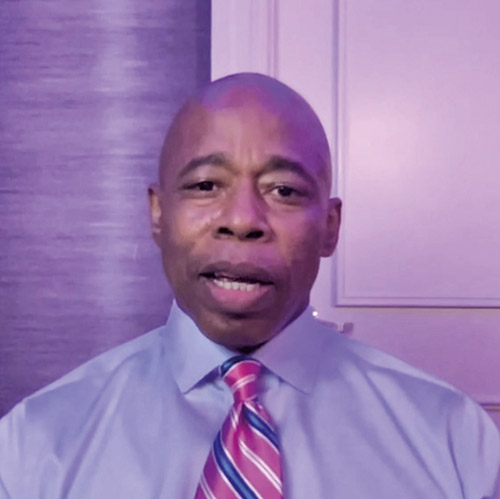





On May 3, SAR High School’s “Elections, Politics and Government (EPG) Club” hosted a virtual student-run, city-wide interfaith forum for six leading New York City Democrat Primary mayoral candidates. Students, representing Jewish, Catholic, Muslim and public schools, presented similar questions to each candidate. Topics included religious life, hate crimes, law enforcement, pandemic recovery and predictions on the next mayor’s first-term accomplishments.
In the first segment, Art Chang, founder of 12 small businesses, who worked under four mayors and two governors, and co-created NYC Votes, the company that distributes the “I Voted” stickers, was asked about his campaign promise to “meet them where they are” and “not employ a one-size-fits-all approach.”
Chang answered, “For years, we’ve seen an administration make decisions at the top, and then pass those decisions down with no further variation. If we talk to the communities, asking them what they are ready for and what risks they are willing to undertake, I think we’re able to do things in a community-by-community basis.”
Andrew Yang, a 2020 Democrat Primary presidential candidate, started “Venture for America,” a non-profit group, working to help create jobs. On the question involving hate crimes and keeping religious institutions safe while balancing the concerns of “over-policing,” he discussed an incident on the Staten Island Ferry. A photographer following his campaign was assaulted by another passenger. Weeks later, three elderly Asians were assaulted. Yang highlighted how we need to recognize mental-health issues in fighting criminal activity.
Yang’s anti-poverty platform includes $1 billion for those in extreme poverty to help connect more people to the financial system. He declared, “It’s very expensive to be poor in New York. They’re getting exploited by check-cashing, money-lending and even pawn shops.
Kathryn Garcia has 14 years of government experience, including serving as sanitation commissioner and COVID-19 crisis manager. She created the emergency food program, delivering 200 million meals. On hate crimes and policing, Garcia supports “neighborhood policing, as well as ensuring that the Hate Crimes Division is fully funded. We need police on the ground, but I feel very strongly that it has to be respectful.” A student asked if Garcia would shift funding from the police to pay for education, affordable housing and food security. Garcia, noting the tremendous amount of money from both the state and federal governments, responded, “Our budget actually will be higher than it was pre-COVID. Due to this influx of money, we need to make sure we’re spending it wisely, on education, art, music and sports in schools. Fundamental city services need to work, kids go to school, the garbage gets picked up and people feel safe in their community. I’m going to take $130 million out of headquarters at the department of education, and move it back into classrooms, where it belongs, where principals should drive the education of their kids and get held accountable.”
Over 36 years, Ray McGuire led businesses, generating over $20 billion in revenue annually. In the last 13 years, he led global corporate and investment banking at Citigroup, while improving the lives of people in low-income communities. McGuire explained, “I will appoint a deputy mayor for public safety, involved in the community, responsible for the day-to-day management of the NYPD, with emergency social services 24/7.” McGuire continued, “Before this, I had ‘My Greatest Most Inclusive Economic Comeback Plan.’ Now, with $15 billion from the federal government, I know how to make this work, facing a four plus billion dollar budget deficit, to create 500,000 jobs. Half of jobs in New York City are small businesses, and integral to our neighborhoods. Businesses would retain New York City sales tax and waive all fees for one year. A deputy mayor for small businesses will monitor the bureaucracy small businesses encounter and invest $100 million so they can give grants to help them flourish.” Citing 30 years of leadership in non-profits, McGuire includes non-profits in his plan.
Brooklyn Borough President Eric Adams, who served in the State Senate and New York Police Department, portrayed himself as a D student. He later became aware of a learning disability.
On restrictions on our lives and religious views, Adams offered, “We have witnessed an uptick in suicides among students. Sociologists talk about being unable to socialize, being inside all the time. Like those living through traumas of Pearl Harbor, the Great Depression, and 9/11, you’re the COVID generation. As mayor, I’m going to ensure that we have the necessary support to get through this.” Look forward to the end of his first term, Adams explained, “We have betrayed New Yorkers. Bishop Desmond Tutu said, ‘We need to stop just pulling people out of the river, but go upstream and find out why they’re falling in.’ We have professionalized hanging out downstream, pulling people out of the river of homelessness, unemployment, incarceration, crime, violence and healthcare crisis. I want to be the mayor that took us upstream. A deputy mayor of youth engagement, aged 21-29, would report directly to me, looking through the eyes of young people. I’m not 18; I’m not 21. I’m 60. I cannot define your reality for you. You have to define it yourself.”
New York City Comptroller Scott Stringer has over three decades of public service, as state assembly-member, Manhattan borough president and a community planning board member in Washington Heights, starting at age16. For his hypothetical look-back at his first term, Stringer theorized, “We need affordable housing, quality education and a plan to rebuild our city and protect our planet. As comptroller I finished the largest fossil fuel divestment ($4 billion), in the history of the city and country.” He added, “It may shock you to know 50% of FEMA money after Hurricane Sandy remains unsettled. We have to think about the climate and the green economy. My goal as mayor is to put a solar panel on every roof, and an electric battery in every basement.”
By Judy Berger













